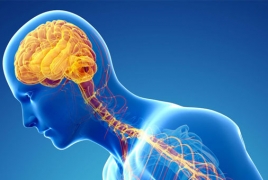
In a study published in Human Molecular Genetics, scientists in Japan have identified a genetic mutation that may drive the onset of a hereditary form of Parkinson’s Disease (PD), the Asian Scientist Magazine reports.
PD is the second most common neurodegenerative disorder, with up to ten million people affected worldwide. PD is characterized by a progressive increase in movement disability and impaired balance, which result from the loss of dopaminergic neurons in the brain.
While most PD occurs sporadically, about 15 percent of cases are hereditary and linked to genetic mutations. Although the motor symptoms can be partly alleviated with dopamine replenishment therapy, there is still a need to develop new treatments that delay or prevent PD.
In this study, researchers from Osaka University and Tohoku University in Japan have clarified how a mutation in the DNAJC13 gene may contribute towards the development and progression of hereditary form of PD known as PARK21.
“Mutations in the DNAJC13 gene are known to cause defects in intracellular transport,” said Dr. Shun Yoshida of Osaka Universitu.
“A significant amount of α-synuclein (αSYN), which builds up in neurons of patients with PD, is transported as cargo within neurons. Hence, we speculated that disrupting DNAJC13 might impair neuronal transport of αSYN.”
The researchers induced mutant DNAJC13 in neuronal cells in a fruit fly model of PD and found that intracellular cargo trafficking became highly congested. αSYN was no longer transported correctly, and they formed intraneuronal protein aggregates, called Lewy bodies, in the fly brains, resulting in the loss of dopaminergic neurons. These defects had a significant impact on the motor performance of flies—those with defective DNAJC13 had much greater difficulty carrying out motor tasks such as climbing.
“Our findings suggest that mutant DNAJC13 leads to accumulated αSYN, which may lead to Lewy body formation and subsequent damage to motor neurons and pathologies resembling PD,” said co-author Assistant Professor Takafumi Hasegawa of Tohoku University.
“While this work was conducted in flies, we hope that these insights will move us toward a better understanding of how this mutation can lead to PD, as well as provide clues to identify the molecular targets for potential therapeutic interventions.”

